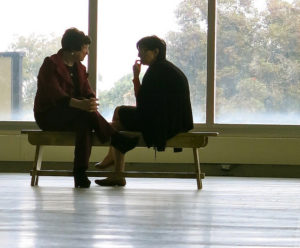For me—an introvert who works in ministry—one of the most dreaded questions asked by an airplane seatmate is, “So what do you do?”

As someone who works in a church, I usually cannot avoid my seatmates’ ensuing thoughts on Christianity, the Church, God, Zen Buddhism, sexual orientation, women in ministry, etc. It’s not that I dislike hearing these thoughts; it’s just that sometimes I prefer to dive into a good novel or a thought-provoking podcast during a long flight. Instead I seem to have a sign on my forehead that says, “Let’s discuss all the contentious issues of the day.”
One day last summer, I was flying home after a trip and I found myself next to a newly retired Navy pilot. He was interviewing for a job at the very airline we were flying, so I was interested to hear about his profession.
In return, of course, he asked about mine. When I told him that my husband and I had just graduated from seminary and explained a little about what we each do, he was excited. He was finishing up a Ph.D. in theology at Liberty University, and he was eager to talk New Testament, theology, and the practice of ministry.
When we got to the topic of women in ministry, however, it became clear that he did not see scriptural support for women’s leadership in the church, and most of what I was saying confounded him.
In the past, I would have felt frustration and impatience rising up from my belly. I might have gotten tongue-tied, snippy, or just cut the conversation off and retreated into my book. This time, however, I was fresh off of Seminary of the Southwest Dean Cynthia Kittredge’s class on Women in Early Christianity, and I knew my Biblical references to support the idea that Jesus, Paul and others were more than okay with women’s leadership in the early days of Christianity.
Instead of flinging those Bible verses at him like arrows, I tried to simply tell him about how liberating and inspiring the passages demonstrating women’s leadership had been for me personally. Thanks to my coursework, I could provide scholarly evidence, and thanks to the reflection we do in seminary, I could talk about how that very evidence helped me voice my own sense of call. He was gracious enough to ask me honest questions and to listen carefully to my responses. I tried to listen equally attentively to his point of view and the parts of the Bible that influenced his perspective.
What followed, therefore, was an extremely respectful dialogue between two people with different backgrounds—two people who probably weren’t going to agree by the end of a two-hour flight. But I did learn from him, and he said I was leaving him with several new ideas to ponder.
I’ve been thinking about this exchange recently as I reflect that our society is missing space set aside for respectful, patient dialogue between people who disagree. We either shy away from tough conversations, knowing they will be awkward or uncomfortable, or we resort to sarcasm and anger and truncate what could be a fruitful conversation. We miss opportunities for more nuanced perspective and deeper compassion.
Two values held by the Seminary of the Southwest community that I admire most are hospitality and authenticity, and I have tried to carry those traits with me since I graduated. Specifically I think about how Academic Dean Scott Bader-Saye emphasized that we should have a “generous intellect” and show hospitality toward ideas that conflict with our own beliefs and opinions. He and the seminary faculty as a whole insisted that we methodically consider each idea instead of reacting immediately on first impulse. An underlying message I received from many professors was, “Be able to articulate clearly what you think, but be open to the fact that other points of view are equally valid.”
An awareness of this practice of a hospitable intellect has been both a gift and a definite challenge this summer as our political scene heats up, and it leads me to wonder if the church could serve as a place where people can practice this generosity to differing viewpoints. It seems to me that we are in dire need of more ways to listen deeply to each other and develop compassion.
How and when do you or could you practice a “generous intellect?”
In what ways can the church serve as a space where difficult but necessary conversations can take place?
Lucy Strandlund graduated from Seminary of the Southwest in 2015 with a Masters in Spiritual Formation. She, her husband Daniel, and their intrepid dog Zooby live in Montgomery, AL. Lucy practices spiritual direction and works at St. Michael & All Angels’ in Millbrook as the lay Assistant to the Rector.

